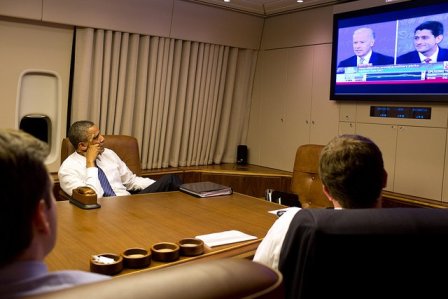 (CNN) -- It was the first-ever debate between two Roman Catholics vying for a White House perch, and in Thursday's face-off between Vice President Joe Biden and vice presidential nominee Paul Ryan, the question was put plainly: How does your faith shape your position on abortion?
(CNN) -- It was the first-ever debate between two Roman Catholics vying for a White House perch, and in Thursday's face-off between Vice President Joe Biden and vice presidential nominee Paul Ryan, the question was put plainly: How does your faith shape your position on abortion?
It's one of the most divisive questions in American politics, and the query from debate moderator Martha Raddatz, asked near the end of the sole vice presidential debate, set the table for some of the night's most personal and poignant moments.
"I don't see how a person can separate their public life from their private life or from their faith," said Ryan. "Our faith informs us in everything we do."
"My religion defines who I am," said Biden. "I've been a practicing Catholic my whole life."
But the two men took very different tacks on applying their faith to the abortion issue. Ryan said his religion -- combined with "reason and science" -- led him to oppose legalized abortion, and that "the policy of a Romney administration is to oppose abortion with exceptions for rape, incest and the life of the mother."
Ryan recalled when he and his wife, Janna, saw the ultrasound of their firstborn child, Liza. "We saw that heartbeat -- a little baby was in the shape of a bean," he said, noting that they still called their daughter "Bean" and saying he believes that "life begins at conception."
"With respect to abortion, the Democratic Party used to say they wanted it to be safe, legal and rare," Ryan continued. "Now they support it without restriction and with taxpayer funding ... that to me is pretty extreme."
Biden said he accepted his church's anti-abortion position -- "life begins at conception in the church's judgment" -- but that he refused to impose that view on "equally devout Christians and Muslims and Jews."
"The next president will get one or two Supreme Court nominees," Biden said. "That's how close Roe v. Wade is. ... Do you think (Romney is) likely to appoint someone like Scalia or someone else on the court far right that would outlaw abortion? I suspect that would happen."
Both men also used the question on abortion and Roman Catholicism to pivot to other issues, with Ryan saying the Obama White House is "infringing on Catholic charities, Catholic churches, Catholic hospitals" presumably because of a new rule requiring insurers to provide free contraception coverage for virtually all American employees.
Before answering the abortion question, Biden said his Catholicism has "informed my social doctrine ... about taking care of those who can't take care of themselves, people who need help."
The Obama campaign and liberal Catholic groups used the debate to organize Catholic watch parties and to argue that Ryan's proposed budget in the House of Representative ran counter to Catholic values.
About one in four American voters is Catholic, though there is such a broad range in Catholic political concerns and voting habits that many political experts reject the notion of a cohesive Catholic bloc.
Catholics have voted with the winning presidential candidate in every election since the early 1990s.
In 2008, Obama beat John McCain among Catholics by 54 percent to 45 percent. In 2004, John Kerry -- the first Catholic nominee for president since John F. Kennedy -- lost the Catholic vote to George W. Bush, provoking Democrats to take Catholic outreach more seriously.
Both major parties had America's highest-profile Catholic cleric, New York Archbishop Timothy Dolan, give the closing prayer at their recent political conventions.
™ & © 2012 Cable News Network, Inc., a Time Warner Company. All rights reserved.
- Home
- News
- Opinion
- Entertainment
- Classified
- About Us
 MLK Breakfast
MLK Breakfast- Community
- Foundation
- Obituaries
- Donate
04-19-2024 6:49 am • PDX and SEA Weather






















































































































































































































































































































